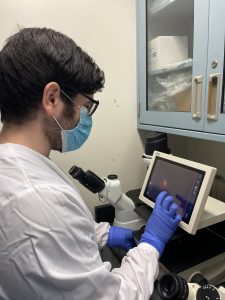Roger Newton ’74 MS, ’05 (HON) has been advocating for the School of Medicine and Department of Nutritional Sciences to collaborate since he was a UConn graduate student in the ’70s. Now they will, thanks to a new fellowship that he and his wife, Coco, established through the Esperance Family Foundation.
The multiyear commitment will enable UConn medical student Nathan Gasek to study how nutrition can be used to promote health and longevity and alleviate aging-related diseases, such as Alzheimer’s.
Gasek’s project will focus on nutritional interventions to prevent and treat Alzheimer’s and other age-related dementia. His work will supplement ongoing research by his advisor, Ming Xu, who has studied the increased prevalence of senescent cells in the elderly that accumulate with age and are thought to cause aging and aging-related diseases.

“Basically, we are trying to slow down the aging process through functional medicine nutrition,” says Xu, an assistant professor at UConn’s Center for Aging and the Department of Genetics & Genome Sciences. “We are trying to make 80-year-old people have the health and well-being of 50-year-olds who have no or far less disease. We are trying to alleviate all kinds of diseases as a group simultaneously. There’s a lot of research being done by us and others showing that if you are able to decrease or prevent the presence of senescent cells in essential tissues, you can make people live longer and live healthier.
“This gift is going to help us achieve our goal faster. In this case, we’re looking into whether it is feasible to offer some novel intervention to prevent and/or treat Alzheimer’s disease in the aging population,” Xu says. “This gift offers financial support, but also mental support. It gives us confidence that through our research, we will have a positive effect on a human condition that is not well understood but can be prevented and treated with nutrition and lifestyle changes.”
UConn’s joint MD/Ph.D. program links many disciplines, but this is the first to connect the School of Medicine with the Department of Nutritional Sciences in the College of Agriculture, Health and Natural Resources.
The joint program requires Gasek to take nutrition courses to gain much-needed nutrition knowledge as a physician scientist and gives him access to faculty expertise in nutritional sciences, opening the door to future collaboration between the two schools, says Ji-Young Lee, professor and head of the Department of Nutritional Sciences. The overall goal is to use nutrition intervention to better inform medicine and patient care and to promote health.
“If the project turns out as we’re guessing, if our hypothesis is correct, we could potentially create nutritional protocols that can target not just Alzheimer’s but, potentially, aging as a whole,” says Gasek, who lost a grandfather to dementia. “That could be really exciting, not just in terms of research, but in terms of actual clinical impact on patients who are suffering from these conditions.”
Long-term supporters
The Newtons have previously supported a number of nutrition-related projects in the Department of Nutritional Sciences through their philanthropy from the Esperance Family Foundation.
“We are thrilled to be involved in the Joint MD/Ph.D. Program, which will open doors for the collaboration of two disciplines, namely medicine and nutrition, that can be impactful to meeting the needs for both the healthy and unhealthy aging population,” Roger Newton says.

He graduated from UConn in 1974 with a master’s degree focusing on the regulation of lipid/cholesterol metabolism, and was awarded an honorary degree in 2005. After UConn, he attended UC-Davis, graduating with a Ph.D. in nutrition, focusing on the regulation of hepatic lipid and lipoprotein metabolism. He did a postdoctoral fellowship in the department of medicine at UC-San Diego in LaJolla, California, then began a 17-year career at Warner-Lambert/Parke-Davis in Ann Arbor, Michigan, where he was the co-discoverer and product champion of the cholesterol-lowering drug, Lipitor.
Newton continued his career for more than 40 years in the pharmaceutical and biotech life sciences industries. He is the founder and former president/CEO/chief scientific officer at Esperion Therapeutics and is the co-discover and product champion of Nexletol, which recently received FDA approval and was launched in 2019 for the treatment of statin-intolerant patients and for those who cannot reach their LDL-cholesterol goals.
The Newtons met at UC-Davis, where Coco Newton graduated with a degree in nutrition and dietetics, completed her dietetic internship at University Hospital. She then attended and graduated from the University of Minnesota with a master’s degree in public health nutrition and was employed as a specialist in hyperalimentation at three different hospitals in San Diego and Ann Arbor before starting her own nutrition practice called Lifetime Nutrition, LLC.
She currently works with ALS patients in North and South America and Europe, using specialized nutrition protocols to inhibit progression and promote regression of the disease. She has been an invited guest lecturer in UConn’s department of nutritional sciences, especially focusing on the use of functional medicine nutrition and its importance in health and treating a variety of diseases. Lastly, she was recognized in 2020 by the Academy of Nutrition and Dietetics (AND) by receiving a Lifetime Achievement Award and, in 2021, she received the Visionary Award from the Dietetic Practice Group within AND called Dietitians in Integrative and Functional Medicine.
Indrajeet Chaubey, dean and director of the College of Agriculture, Health and Natural Resources, says the fellowship will allow for a fresh interdisciplinary approach to aging.
“This collaboration has the potential to lead to transformative breakthroughs,” Chaubey says.
Bruce Liang, dean of the School of Medicine agrees.
“I am so thankful to Roger and Coco for their deep commitment to enhance our student’s understanding of the role nutrition can have in improving patient health,” Liang says.
Carol Pilbeam, director of the MD/Ph.D. program at UConn Health, said Gasek’s project is the ideal for training a physician scientist.
“We are extremely grateful for the award and hope to make Roger and Coco Newton proud,” she says. “This is the first time we have had such a collaboration—a student with advisors for his Ph.D. work from both UConn Health and Storrs. We look forward to many more collaborations.”
If you’d like to find out more about supporting programs like this, please contact Amy Chesmer at achesmer@foundation.uconn.edu or (860) 336-6706 or Peter Lamothe at plamothe@foundation.uconn.edu or (860) 679-4962.



